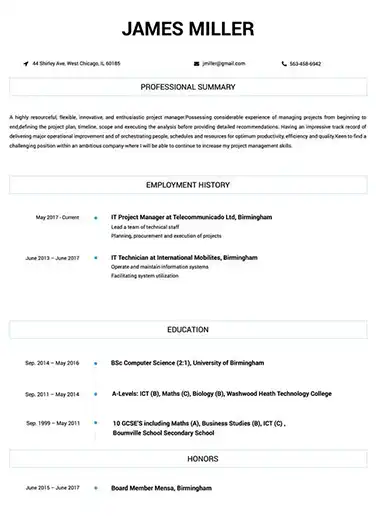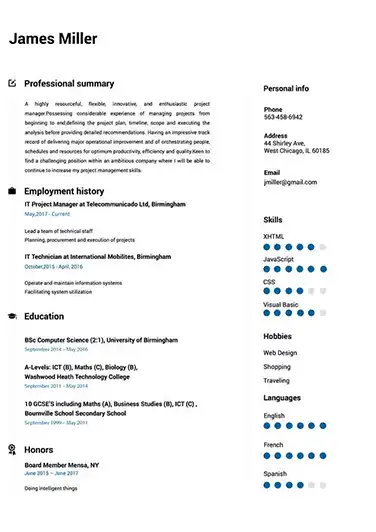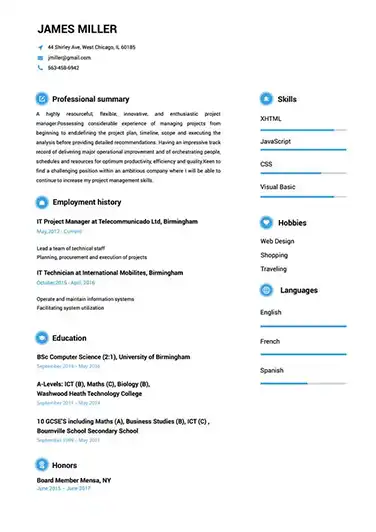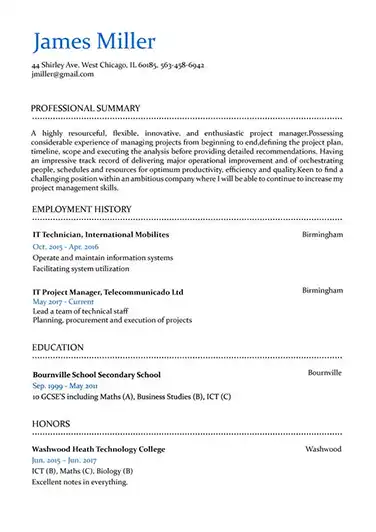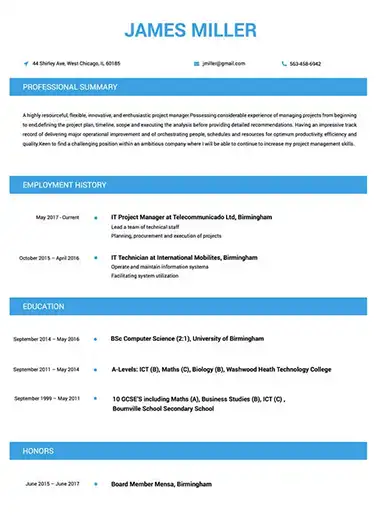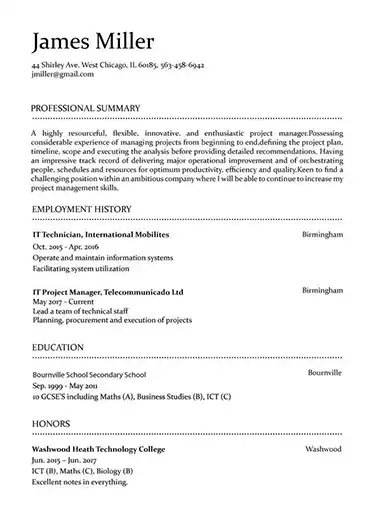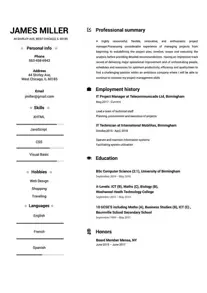 Use This Template
Use This Template
Build your resume in 15 minutes
Create an awesome resume that meets the expectations of potential employers with our selection of professional, field-tested resume templates.
data analyst: Resume Samples & Writing Guide
adamsmark67@outlook.com
953-604-6329
Employment history
- Develop and implement data collection systems and other strategies that optimize statistical efficiency and data quality
- Develop and execute data mining and data analysis algorithms
- Identify, analyze, and interpret trends or patterns in complex data sets
- Identify, analyze, and interpret trends or patterns in complex data sets
- Create and maintain reporting dashboards to track performance metrics
- Develop and maintain data quality standards and procedures
- Develop and execute data mining and data analysis algorithms
- Develop and maintain data reporting and visualization tools
- Analyze financial data and create financial models for decision support
Education
Skills
Do you already have a resume? Use our PDF converter and edit your resume.
foster-derek@zoho.com
719-789-6709
Employment history
- Analyze data from multiple sources to provide actionable insights
- Develop and implement data collection systems and other strategies that optimize statistical efficiency and data quality
- Analyze and interpret data to identify trends and insights
- Develop and maintain data quality standards and procedures
- Create and maintain reporting dashboards to track performance metrics
- Develop and implement databases, data collection systems, data analytics and other strategies that optimize statistical efficiency and quality
- Analyze data from multiple sources to provide actionable insights
- Monitor and analyze KPIs and other performance metrics
- Develop and maintain data reporting and visualization tools
Education
Skills
xavierparker73@yandex.com
981-548-6258
Employment history
- Prepare and present reports to senior management and other stakeholders
- Analyze financial data and create financial models for decision support
- Identify, analyze, and interpret trends or patterns in complex data sets
- Develop and maintain data quality standards and procedures
- Design and develop data models to support business decisions
- Develop and maintain data reporting and visualization tools
- Identify, analyze, and interpret trends or patterns in complex data sets
- Develop and maintain data reporting and visualization tools
- Develop and implement databases, data collection systems, data analytics and other strategies that optimize statistical efficiency and quality
Education
Skills
quinnwood@outlook.com
786-252-4567
Professional Summary
Employment history
- Collaborate with stakeholders to identify business requirements and develop data-driven solutions
- Develop and maintain data quality standards and procedures
- Monitor and analyze KPIs and other performance metrics
- Prepare and present reports to senior management and other stakeholders
- Analyze and interpret data to identify trends and insights
- Develop and maintain data reporting and visualization tools
- Develop and maintain data reporting and visualization tools
- Prepare and present reports to senior management and other stakeholders
- Analyze and interpret data to identify trends and insights
Education
Skills
wilson_ulrich@protonmail.com
896-541-9004
Employment history
- Develop and maintain data quality standards and procedures
- Develop and maintain data reporting and visualization tools
- Present data in a clear and concise manner to support business decisions
- Create and maintain reporting dashboards to track performance metrics
- Monitor and analyze KPIs and other performance metrics
- Present data in a clear and concise manner to support business decisions
- Monitor and analyze KPIs and other performance metrics
- Develop and execute data mining and data analysis algorithms
- Develop and maintain data quality standards and procedures
Education
Skills
Not in love with this template? Browse our full library of resume templates
Long gone are the days when all a data analyst had to do was operate a few computer programs. The data analysts of today’s working world are versatile and dynamic workers, highly regarded by their companies for the sheer amount of value they bring to the table.
If you’re interested in applying to a data analyst position, you’ll need the perfect resume. That can seem a little daunting, particularly for such a technical position, so we’ve decided to create the definitive guide to crafting a world-class data analyst’s resume.
We’ll be covering the hard & soft skills you’ll need (as well as how to reference them), the best formatting tips, how to write a perfect resume objective or summary, and even how to write a data analyst resume if you have no experience. Towards the end of the guide you’ll find advice on standing out from the crowd as a data analyst, in addition to a few tips on what goes into making a truly effective data analyst’s resume.
Template Examples
How to Format the Resume
The best format for a data analyst’s resume is the reverse-chronological style. What makes this format so impressive is that it highlights your skills and experience by putting them right at the top of the document. Since you can’t count on a recruiter spending more than a few seconds on each resume, it’s vital that you grab their attention sooner rather than later.
Stick to classic fonts, such as Times New Roman, and don’t overcomplicate the headings you use. Make sure you use plenty of white space, as a way to make life easy on whoever’s reading your resume. When it comes to contact information, keep it simple: your name, current phone number, and professional email address are all you need to consider.
What Recruiters Will Look For
It’s important to be able to look at the hiring process from the recruiter’s POV. Over and above the formatting and any relevant experience you may have, the person going through candidates for the position will be on the lookout for some particular traits, which they have identified as crucial to the success of the new employee. These tend to vary from company to company, as every enterprise has its own personal and business outlook, but there are some common factors that will apply to every data analyst’s resume owing to the nature of the job. Recruiters sorting through a pile of data analyst resumes will be looking for a few key traits:
1. Analytical Ability
Your employer needs to know you can handle any technical challenges you'll encounter. This is the most important aspect of a candidate’s proposal; if your analytical skills aren’t up to par, a business might baulk at the idea of giving you such a crucial, technical role as a data analyst.
If you can succeed in making your analytical ability clear and obvious, you’ll be making the rest of what you offer even more impressive. If your technical skills are beyond all doubt, the recruiter will already be positively predisposed to the rest of what you offer as a candidate.
2. A Problem-Solving Attitude
You’ll need to show the recruiter that you’ve got the right attitude when it comes to solving problems. Being open-minded, creative, and proactive goes a long way. You’ll have to solve problems day in, day out.
The best way to show the recruiter you’ll be able to handle such issues is by making it clear you’ve got the right attitude. With the right problem-solving mindset, you’ll be able to promise consistency, even though the problems you come up against will be varied and diverse.
3. Interpersonal Competence
An analytical wizard with no communication ability isn’t all that useful to a business. You need to prove that you can work in a team and present your results to non-experts. This is especially important in today’s business environment, which is dynamic and multi-faceted.
As a data analyst, you can expect to spend some time working with individuals and groups from other departments. Being able to explain the work you’re doing in simple, jargon-free language will go a long way towards making you an attractive candidate.
Which Skills to Mention and How to Do It Correctly
For your resume to stand out, you'll need to highlight more than just your technical abilities. The key concept to get your head around is the division between hard and soft skills. Including each group of skills in the right way will go a long way.
Hard Skills
For a data analyst, hard skills include:
- Being able to use Tableau or similar software packages
- Being able to code in languages like SQL, R, and SAS
- Familiarity with Data Warehousing
- Being so familiar with the field of statistics that you can adapt to whatever the job at hand requires
When you’re writing about your hard skills, it’s important to keep things short and to the point. You might want to wax lyrical about how well you know your trade, but writing too much could actually do more harm than good, and here's why:
Your potential employer wants a capable analyst who can handle their work efficiently. Being direct in your writing about the hard skills you have is a great way to communicate how precise you can be. A good rule of thumb to keep in mind is that less is more when it comes to the technical side of this position.
More specific hard skills that would be relevant to your work as a data analyst include:
Statistical Modelling
- Regression (linear and logistic)
- Forecasting
- Principal components analysis & factor analysis
- The basics, such as sampling, bias, model validation, etc.
Machine Learning
Experience with machine learning isn't expected for every data analyst job. If you can include in your resume, though, you'll really impress the recruiter.
- Artificial neural nets
- Decision trees
- Experience using machine learning programs
Presentation
It's important that you can present your findings in a visual, engaging way to non-experts in the field. To this extent, PowerPoint skills will come in handy, as will being proficient with Excel.
Soft Skills
When you’re talking about your soft skills you’ll need to communicate in a way that inspires a connection. This stands in contrast to the crisp, concise way you should discuss your hard skills.
You need to make sure the recruiter gets a sense of you as a well-rounded, open individual. Leadership, interpersonal effectiveness, and having the mentality of a team player all go a long way. Here are some of the soft skills to consider including:
- Communication
- Interpersonal effectiveness
- Leadership
- Delegation
- Being a team player
- Time management
- Cutting down on jargon
The Best Way to Include Digital Skills in a Data Analyst’s Resume
Data analysts need to draw on many different skills during the course of their day-to-day work, and most of them are technical and involve the use of various pieces of software. How to reference these digital skills on a regular resume isn’t always obvious, but this is how you should go about it.
The best way to include digital skills on a data analyst’s resume isn’t to list them all together, but rather to group them into two main headings — analytical skills and more standard technical skills.
Under the first category you should include proficiency with statistics, as well as with any relevant software packages (such as Tableau or Excel). Each skill you list will also have a more impressive effect on your prospective employer if you tie it in to what you’ll be able to use it for on the job. For example, rather than simply mentioning that you’re used to using q, it’s a good idea to throw in the fact that you can use your Q experience to analyse customer behaviour.
As for the standard technical skills, you’ll want to talk about the different computer languages you’re comfortable coding in. Programming is becoming a more and more important quality for data analysts to have. The same rule applies here, too; rather than claiming you’re experienced in SQL, make sure you mention what kind of common problems your SQL knowledge can help you to solve, e.g. designing a custom query to prompt the database in question to return only very specific fields.
How to Write a Resume Objective & Examples
A resume objective should make it clear to the employer that you have the requisite skills, experience, and personality traits to fit the specific position you’re applying for. Generalities should be avoided at all costs — this is your chance to show you thoroughly understand what they’re looking for.
The first step of writing a resume objective is to figure out what traits, skills, and experience the ideal candidate would have. This can be done by carefully reading the listing and comparing it to other data analyst job listings to see what’s different. Once you know what they’re looking for, craft your objective statement in a way that makes it clear you’re the right candidate for the job. Be holistic: mention experience and your skills, but also talk about the personality traits you possess that would make you a good choice.
Here are a couple examples of well-written resume objectives:
- Organized, passionate data science professional seeking the role of Data Analyst at Example Inc. I have worked extensively with SQL, R, SAS, and data warehousing. I’m used to modelling data sets to improve business efficiency, and have a lot of experience functioning as the leader of a team in order to solve particularly complex problems.
- Knowledgeable Data Analyst interested in filling that role within ABC Corp. Bringing 8 years of experience with designing database procedures and processes to the table. Keen on bringing programming acumen (R & SQL), creative thinking, and a no-nonsense approach to jargon to the table. Fascinated by data warehousing, always willing to learn new things about the field I love.
How to Write a Resume Summary & Examples
The best way to think of a resume summary is as an elegant way to highlight your technical aptitude for the job. In the case of data analyst positions the summary is even more important, given the highly technical nature of the work.
Your resume summary should go right at the top of your resume. The first paragraph could well be the only chance you get to command the full attention of the recruiter, so your goal is to make such a solid pitch that you encourage them to read further, and to pay attention to everything that comes below. Here are some examples of great resume summaries. Note their brevity and no-nonsense writing style, designed to make a sizable impact in the shortest possible amount of time.
- Driven, versatile data science expert interested in bringing 10+ years of experience to that position in XYZ Inc. Passionate about modelling business data to improve existing processes. Strong problem-solving & organizational skills, prior experience in successfully leading small teams. In my past work I’ve boosted operating efficiency by 7.5% as a result of creating in-depth models and identifying weak points in a strategic business model.
- Professional data analyst with 5 years of working experience interested in filling that role at Sample Corp. I’ve saved my past employer over $1,500,000 by identifying and resolving inefficient processes. I like brainstorming creative solutions to problems and then backing my conclusions up with hard data and figures.
How to Write a Data Analyst’s Resume with No Experience
If you have no direct experience with data analysis, you’ll be at a disadvantage compared to other applicants. However, this disadvantage is by no means a fatal flaw to have in the job application process. As a matter of fact, if you structure your resume properly and nail the way you write it, you could well leapfrog over competitors with more experience but less impressive resumes.
The important thing to understand is that if you can sell yourself as somebody who is a quick learner, you’ll likely be able to offset the damage a lack of experience could cause. Large companies typically won’t have a huge problem with training a promising candidate in their discipline of choice, particularly if they believe the candidate in question would be a significant asset for other reasons.
Here are a few guidelines to follow in order to make the most of a no-experience resume:
1. Talk about the Experience You Do Have
Whether you lack experience because you’re transferring to data analysis from another field or whether it’s because you’re fresh out of college, chances are you do have some experience you can talk about in your resume.
When you mention it, make sure to highlight the ways your skills are transferable to a data analyst position. This will kill two birds with one stone, as not only will you be proving that you’re somebody who can adapt to the demands of the job, but you’ll also be displaying an in-depth knowledge of what the job itself demands day in, day out.
2. Don’t Try to Hide Your Lack of Data Analyst Experience
Papering over the cracks will do more harm than good in this case. Rather than trying to hide the fact that you’ve never worked as a data analyst before, you should be upfront about it. Not only will the recruiters appreciate your honesty (after all, it’ll be obvious to them if you don’t have experience), you’ll also be presenting yourself as a confident, self-assured individual. Since you can’t sell your work history, you need to sell yourself.
How to Match Your Skills to the Position You’re Applying For
Even the most well-written resume will likely go unanswered if it’s clear that you haven’t tried to tailor your skills to the job post in question. The most efficient way to do this is to watch out for certain key words in the listing, which will serve as clues as to which skills you should emphasise and which should be relegated to the background.
There’s no end to how many of these words there are, but it’s not too difficult to group them under overarching categories and work from there. The two main job requirements you’ll be prospecting for are as follows (with some examples of the words in question you’ll want to be on the lookout for):
- Leadership. Data analysts are often required to take the lead on certain projects. If you come across words like manage, oversee, and direct, you’ll need to make sure you highlight your leadership skills. The best way to do this is by talking briefly about the project in question when you mention the skill, e.g. instead of simply mentioning that you have management experience, spending a sentence or two describing the project you took the lead on, and what you learned.
- Communication. These days, practically no department works in isolation. If there are words like present, communicate, discuss, and integrate, you’ll need to highlight your softer skills, such as interpersonal relationship management, critical discussion, and delegation.
- Analytic ability. Obviously you’re going to be doing some analysing at your prospective job, but the key takeaway here is to focus on using the same language used in the job listing to highlight your relevant skill set.
How to List Additional Details (e.g. Certifications, Online Courses, Volunteering, Hobbies)
Additional details can turn a good resume into a great one, even for a position as technical and granular as a data analyst. Not all additional details were created equal, though, with some playing a more important role than others. Here’s the hierarchy of extra information, ranked by importance to a data analyst’s resume:
1. Online Certifications
There’s no end to the amount of online courses you can take these days, and recruiters know that as well. If you have any relevant certification you’ve completed online, mentioning it directly below your experience will prove that you’re an autodidact, capable of educating yourself but also motivated and dedicated enough to actually follow through on a project once you set your mind to it. Keep it short: by mentioning the course and the completion date in one sentence, you’ll be implying that the value of the qualification is self-evident, which will impress anybody reading your resume.
2. Awards
Awards impress everybody, even if they’re not entirely related to the job at hand. If you’ve won anything significant, such as a prize in college or a high-placed finish in a Kaggle competition, mention it below your online certs and spend a sentence or two explaining what you won. Don’t be falsely modest here, but don’t be over-the-top either. Just provide enough information for the recruiter to get a sense of the magnitude of your achievement, and then leave it there.
3. Volunteering
Volunteering demonstrates compassion, drive, and energy, particularly if you’ve kept it up for an extended period of time. When writing about any volunteering you’ve been up to, it’s worth spending a few brief sentences talking about how you chose that project in particular.
4. Hobbies & Interests
The last bit of writing in your resume should be devoted to your hobbies and interests. One common mistake candidates applying to all kinds of jobs make is assuming their hobbies need to somehow relate to the position in question. In truth, that can wind up looking somewhat artificial, particularly if there’s no variety whatsoever (e.g., a data analyst who spends his free time reading statistics textbooks). Instead, be frank about it. Sports, creative activities, and musical instruments all add depth to the image of yourself as a candidate and help to bring your character to life in the eyes of the recruiter.
Simple bullet points listing two or three of your main hobbies and interests are all that’s required here. Take care not to go overboard.
How to Stand Out from the Crowd as a Data Analyst
For a position as a data analyst, candidates often assume they need to be dry, to the point, and plain, in keeping with what they see as the main requirements of the job. There’s also a tendency to over-focus on the hard skills while neglecting the value of high-level interpersonal ability. This attitude, which is surprisingly pervasive, gives you an excellent chance to stand out from the crowd by doing the opposite.
Your recruiter will probably have sifted through several other resumes by the time they get to yours, which means they’re probably tired of hearing about the technical side of the job. If you’re able to put more emphasis on the soft skills than the people you’re competing with for the position, you’ll be marking yourself out from the crowd in a powerful, immediate way.
Being able to handle yourself in a collaborative environment is every bit as important as your statistical prowess. If you can demonstrate that you understand the importance of the softer skills, you’ll make an impression on the recruiter, which is the best thing you can hope for in a situation where it’s your resume against a pile of others.
What Makes a Data Analyst’s Resume Effective
An effective data analyst’s resume needs to pack a heavy informational punch in as few words as possible. The last thing you want is for your resume to seem bloated and verbose. Aim to fit it all into one page, and you won’t go too far wrong.
Once you have a draft of your resume, take a break and come back to it later. Looking over what you’ve written with fresh eyes will reveal areas that could be improved upon. There’s no room for sentimentality when it comes to crafting an effective resume — you must be prepared to cut what you’ve already written over and over again.
Any information that seems superfluous needs to go. Your writing style must be as concise as possible, and paragraphs should be no longer than a few sentences. You’ll want it to be as short as possible without losing any important information; a 500-word resume with as much pertinent information as a 1000-word resume will always be more effective.
How Resumebuild Can Be Used to Craft the Perfect Data Analyst Resume
All that information might seem a little overwhelming, but there’s a fantastic tool out there you can use to make creating a strong data analyst resume a breeze. Resumebuild offers a resume building tool which allows its users to choose from a large number of slick, modern templates, each of which has been built on the foundations of best-practice industry guidelines and techniques.
With thousands of pre-written samples built-in to the program to keep you on track, all you need to do is pick the perfect template for you, input your own personal touches, and download the finished product. Applying to your next dream job couldn’t be simpler.
data analyst Job Descriptions; Explained
If you're applying for an data analyst position, it's important to tailor your resume to the specific job requirements in order to differentiate yourself from other candidates. Including accurate and relevant information that directly aligns with the job description can greatly increase your chances of securing an interview with potential employers.
When crafting your resume, be sure to use action verbs and a clear, concise format to highlight your relevant skills and experience. Remember, the job description is your first opportunity to make an impression on recruiters, so pay close attention to the details and make sure you're presenting yourself in the best possible light.
data analyst (hunter)
- Identify individual as well as team productivity, To analyze the work of Hunter Team.
- Coordinating with sales teams to solve their queries and to control business loss by analyzing case studies.
- Communicating with 1000s of customers daily through Mail-merge.
- Prepare reports summarizing operational results, or accomplishments of specified objectives, goals, or plans.
data analyst
- Identify and spearhead strategic team initiatives to improve overall data performance of clients, resulting in a 25% improvement in overall performance
- Supervised 20+ data analysts to oversee project plans, complete project deliverables and milestones using Salesforce.
- Performed a Liasion role for Services, Development, Product Management and value advisor team to improve the overall efficiency of the product and did so by bringing the overall efficiency to 80% from 38%.
- Identified data integrity issues between client source systems, and addressed them by building crosswalks to promote accurate data association for clients.
- Responsible for implementation and Maintenance of Data Integrity of our business intelligence applications for members and ensuring Business SLA’s are met
- Created and Maintained KPI dashboards in Microsoft Excel using pivot and Vlookup which was used by the whole Data Analyst team for monitoring their KPI performances
- Currently building one of the worlds largest claims data pipeline for cohort comparison and R & D analytics consisting of UHG,Medicare and BHI
data analyst
- For all zip codes available in each state, prepare the data to calculate the DOM (Days-on market) for,all active/pending properties.
- Data Pre-processing using Python.
- Data cleaning.
- Writing the output results to MongoDB using Python.
data analyst
- Analyzing practice matches with API.
- Pre-processing the dataset with R/Matlab.
- Data Visualization with R.
- Analyze and Rectify information given by client, report findings and recommendations.
data analyst, scripps bio-medical engineering
- Use computers for various applications, including database management and word processing.
- Compare data with source documents and re-enter data in verification format to detect errors.
- Provide administrative support for system-wide electronic work order systems.
- Assist manager with development of short and long term departmental goals and objectives.
- Compile weekly status reports.
- Maintain equipment maintenance intervals.
data analyst (hunter) Job Skills
For an data analyst (hunter) position, your job skills are a key factor in demonstrating your value to the company and showing recruiters that you're the ight fit for the role. It's important to be specific when highlighting your skills and ensure that they are directly aligned with the job requirements, as this can greatly improve your chances of being hired. By showcasing your relevant skills and experience, you can make a compelling case for why you're the best candidate for the job.
How to include technical skills in your resume:
Technical skills are a set of specialized abilities and knowledge required to perform a particular job
effectively. Some examples of technical skills are data analysis, project management, software proficiency,
and programming languages, to name a few.
Add the technical skills that will get hired in your career
field with our simple-to-use resume builder. Select your desired resume template, once you reach the skills
section of the builder, manually write in the skill or simply click on "Add more skills". This will
automatically generate the best skills for your career field, choose your skill level, and hit "Save &
Next."
- Data Mining
- Data Modeling
- Statistical Analysis
- Business Intelligence
- Data Visualization
- Machine Learning
- SQL
- Python
- R Programming
- Tableau
- Data Warehousing
- SAS
- ETL
- Big Data
- Excel
- T-SQL
- Hadoop
- Java
- MATLAB
- C++
How to include soft skills in your resume:
Soft skills are non-technical skills that relate to how you work and that can be used in any job. Including
soft skills such as time management, creative thinking, teamwork, and conflict resolution demonstrate your
problem-solving abilities and show that you navigate challenges and changes in the workplace
efficiently.
Add competitive soft skills to make your resume stand-out to recruiters! Simply select
your preferred resume template in the skills section, enter the skills manually or use the "Add more skills"
option. Our resume builder will generate the most relevant soft skills for your career path. Choose your
proficiency level for each skill, and then click "Save & Next" to proceed to the next section.
- Communication
- Interpersonal
- Leadership
- Time Management
- Problem Solving
- Decision Making
- Critical Thinking
- Creativity
- Adaptability
- Teamwork
- Organization
- Planning
- Public Speaking
- Negotiation
- Conflict Resolution
- Research
- Analytical
- Attention to Detail
- Self-Motivation
- Stress Management
- Collaboration
- Coaching
- Mentoring
- Listening
- Networking
- Strategic Thinking
- Negotiation
- Emotional Intelligence
- Adaptability
- Flexibility
- Reliability
- Professionalism
- Computer Literacy
- Technical
- Data Analysis
- Project Management
- Customer Service
- Presentation
- Written Communication
- Social Media
- Troubleshooting
- Quality Assurance
- Collaboration
- Supervisory
- Risk Management
- Database Management
- Training
- Innovation
- Documentation
- Accounting
- Financial Management
- Visualization
- Reporting
- Business Acumen
- Process Improvement
- Documentation
- Relationship Management.
How to Improve Your data analyst (hunter) Resume
Navigating resume pitfalls can mean the difference between landing an interview or not. Missing job descriptions or unexplained work history gaps can cause recruiters to hesitate. Let's not even talk about the impact of bad grammar, and forgetting your contact info could leave your potential employer hanging. Aim to be comprehensive, concise, and accurate.
Employment history
- Develop and execute data mining and data analysis algorithms
- Create and maintain reporting dashboards to track performance metrics
- Develop and implement data collection systems and other strategies that optimize statistical efficiency and data quality
- Identify, analyze, and interpret trends or patterns in complex data sets
- Collaborate with stakeholders to identify business requirements and develop data-driven solutions
- Analyze financial data and create financial models for decision support
- Collaborate with stakeholders to identify business requirements and develop data-driven solutions
- Monitor and analyze KPIs and other performance metrics
- Analyze data from multiple sources to provide actionable insights
Education
Skills
Provide your Contact Information and Address Year Gaps
Always explain any gaps in your work history to your advantage.
Key Insights- Employers want to know what you've accomplished, so make sure to explain any gaps using a professional summary.
- Adding extra details and context to explain why you have a gap in your work history shows employers you are a good fit for the position.
How to Optimize Your data analyst (hunter) Resume
Keep an eye out for these resume traps. Neglecting to detail your job roles or explain gaps in your career can lead to unnecessary doubts. Grammar blunders can reflect negatively on you, and without contact information, how can employers reach you? Be meticulous and complete.
ollie.white@protonmail.com
831-588-8235
Employment history
Education
Skills
Include Job Descriptions and Avoid Bad Grammar
Avoid sending a wrong first impression by proofreading your resume.
Key Insights- Spelling and typos are the most common mistakes recruiters see in resumes and by simply avoiding them you can move ahead on the hiring process.
- Before submitting your resume, double check to avoid typos.
data analyst (hunter) Cover Letter Example
A cover letter can be a valuable addition to your job application when applying for an data analyst (hunter) position. Cover letters provide a concise summary of your qualifications, skills, and experience, also it also gives you an opportunity to explain why you're the best fit for the job. Crafting a cover letter that showcases your relevant experience and enthusiasm for the Accounts Payable role can significantly improve your chances of securing an interview.
Adams adamsmark67@outlook.com
953-604-6329
528 Parkview Drive, Greenfield, WI
53228
PwC
Dallas, Texas
Esteemed PwC Hiring Team
I am excited to apply for the Senior Data Analyst position at PwC. As a highly skilled Data Analyst with 10 years of experience in Business Strategy & Analysis, I am confident that I can contribute significantly to your organization.
As someone who has always been curious and eager to learn, I have pursued my education and gained experience in areas like Risk Analysis to develop my skills in my work. This experience has given me the opportunity to lead major projects and provide my input in diverse areas, which have helped me gain a deeper understanding of the industry. I am excited to bring my passion and expertise to the role at this company and work towards achieving your organization's goals.
I cannot stress enough how thrilled I am about the chance to join a team of like-minded individuals who share my values and passion for this amazing field. Thank you for considering my application and I hope for the chance to work together.
Respectfully,
Mark Adams
953-604-6329
adamsmark67@outlook.com
Mark Adams
Showcase your most significant accomplishments and qualifications with this cover
letter.
Personalize this cover letter in just few minutes with our user-friendly tool!
Related Resumes & Cover Letters

Build your Resume in 15 minutes
Create an awesome resume that meets the expectations of potential employers with our selection of professional, field-tested resume templates.

